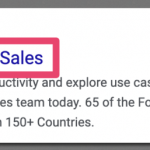- Like
- SHARE
- Digg
- Del
- Tumblr
- VKontakte
- Flattr
- Buffer
- Love This
- Save
- Odnoklassniki
- Meneame
- Blogger
- Amazon
- Yahoo Mail
- Gmail
- AOL
- Newsvine
- HackerNews
- Evernote
- MySpace
- Mail.ru
- Viadeo
- Line
- Comments
- Yummly
- SMS
- Viber
- Telegram
- JOIN
- Skype
- Facebook Messenger
- Kakao
- LiveJournal
- Yammer
- Edgar
- Fintel
- Mix
- Instapaper
- Copy Link
Proper choice of keywords is just one element of the SEO process. Knowing where, when, and how to place these keywords for better ranking, making them easily searchable and ultimately helping your website to perform better on search engines.
Keyword takes time to master. You must observe how organic and inorganic traffic is behaving on your website in order to appropriately implement the relevant keyword strategy. Keyword mapping is an on-page optimization process that has to be research-driven for you to discover where to optimize and what content to build. What exactly do you need to do to succeed in Keyword mapping for 2021? Here is a comprehensive guide.
Create a List of Keywords
The first step to understanding how your keyword positioning is creating an elaborate list of keywords. This will help you conduct a good analysis and conduct proper research on the keywords that best fit into certain pages and go along very well with particular content.
People use certain words and phrases to search for content online. If you make enough effort to find out exactly what these words are, then you stand a very good chance of directly affecting or influencing search results. This actually should be a central part of building up your content.
Keywords Grouping and Page Targeting
A lot of thought has to be given to keyword placement in particular pages. Sometimes, you have a situation where a single keyword or a group of keywords can be used for different blog posts. Whether this affects your content positively or negatively depends on how you eventually organize your work.
Since you have already sorted your keywords and identified what’s most important, you can now place them on the most relevant pages. Avoid placing keywords on random pages. Instead, work towards placing your keywords/topics on pages that are most specific and have a connection with the content you create.
Keywords that answer the same question
When you are addressing different topics in your blog posts, it’s easy to classify keywords depending on the topic you are addressing, however, some topics and questions overlap, and you may end up having similar or related keywords answering the same question.
It’s important that you think of the visitor’s intent and know where and how to group keywords that answer the same question. For instance, if you are addressing accommodation in Brisbane, try to think of what different searchers might be looking for. A bit of research will give you specific results and clearly show how the kind of results some keywords produce. This kind of categorization is essential in your keyword mapping journey.
Improve Rankings through Better CRT
Click-through-Rate is a good indicator of SEO health on your website. Proper keyword mapping could significantly help your CTR in the long term. This could be particularly beneficial when you already have a page that is authoritative.
Whereas CTR is key to SEO, you must also be careful to have it translate into business. More CTR should generate more sales, leads, brands, and gains for your business. All this is achievable through well-harnessed SEO techniques.
Avoid Keyword Cannibalization
With proper keyword mapping, you reduce the chances of keyword cannibalization. But what is keyword cannibalization?
In a situation where you have so much content published on your website, you run the risk of having content that competes against itself. In other words, you have content that belongs to the same website but competes for attention in search results. You can avoid this through careful, deliberate keyword mapping.
Before you start using various keywords, assign them to different pages. Joel House SEO Canberra argues that this helps you to outline a strategy in which keywords are tracked, wells structured, and streamlined. You will also know which keywords have been used at what point and how to avoid making them repetitive. It’s a difficult task fixing keywords that are cannibalizing as it takes a lot of time and effort. Sometimes you may have to rewrite content on entire pages to remedy this.
Make Corresponding URLs/ Subdirectories
Having identified the most appropriate keywords, it’s time to make use of them with actual on-page usage. Create subdirectories that help to direct visitors to the site.
Make a logical, search-friendly path. You will also be in a position to evaluate the keywords that make suitable URLs as well as those that are good for other purposes within your website.
Why Will Keyword Mapping Be important to you in 2021 and going forward?
We are now in an era where you not only optimize whole pages but small details that lead to greater results in your SEO process. Keyword mapping is an all-encompassing process that can significantly help you scale up your ranking. It gives you a sense of thoroughness and specificity that helps particular words and phrases to stand out. You can fine-tune your keywording mapping process for 2021 by doing the following:
Keep Good track of pages that need Content Updates.
Avoid duplicate content and keywords by keeping track of your content. Check out what updates are needed and carry them out. Importantly, create a system that allows you to keep dates when you use particular keywords. Set a target to update content after a given period of time. For example, if you have lots of blog posts on your website, ensure you revisit content every 8-12 months and see whether you need to make any updates. This keeps them relevant and ranking better, time, and again.
Combine Both Long-Tail and Short-Tail Keyword Variations
Short tail keywords happen to be highly competitive. This means that several other competitors might have similar or close variations of the same keywords as you. However, they are still effective and should be considered for any content. For more efficiency, you can combine this with long-tail keyword variations. This gives you a chance to incorporate several possible ideas that your visitors might use to search for content.
Key Takeaways
Conduct keyword research before developing content
Don’t create content blindly: know whether indeed your audience will come looking for it. This will allow you to insert the most appropriate keywords they might use
Define User goals and intent to craft the best keywords
To some extent, this boils down to understanding your audience. When you know the kind of content they yearn for, you will be able to create content that’s specific to their queries and satisfies their need. Keyword placement will be much easier this way.
Avoid duplication of pages, content, and keywords cannibalization.
You can only avoid this kind of duplication through proper evaluation of the content you create. If you are working on a new website for 2021, make a deliberate effort to accurately curating each page and, ultimately all the content you create. If you do this, your keyword mapping process will be easier and more effective. Don’t wait until you have loads of content to start evaluating keyword performance.
Conclusion
As we get into 2021 and beyond, keyword mapping will be an essential process in distinguishing content and making it stand out. Competition is getting stiff, and only those who are able to adapt quickly will register substantial growth through better ranking. Follow this guideline and witness your keyword processes getting easier.


